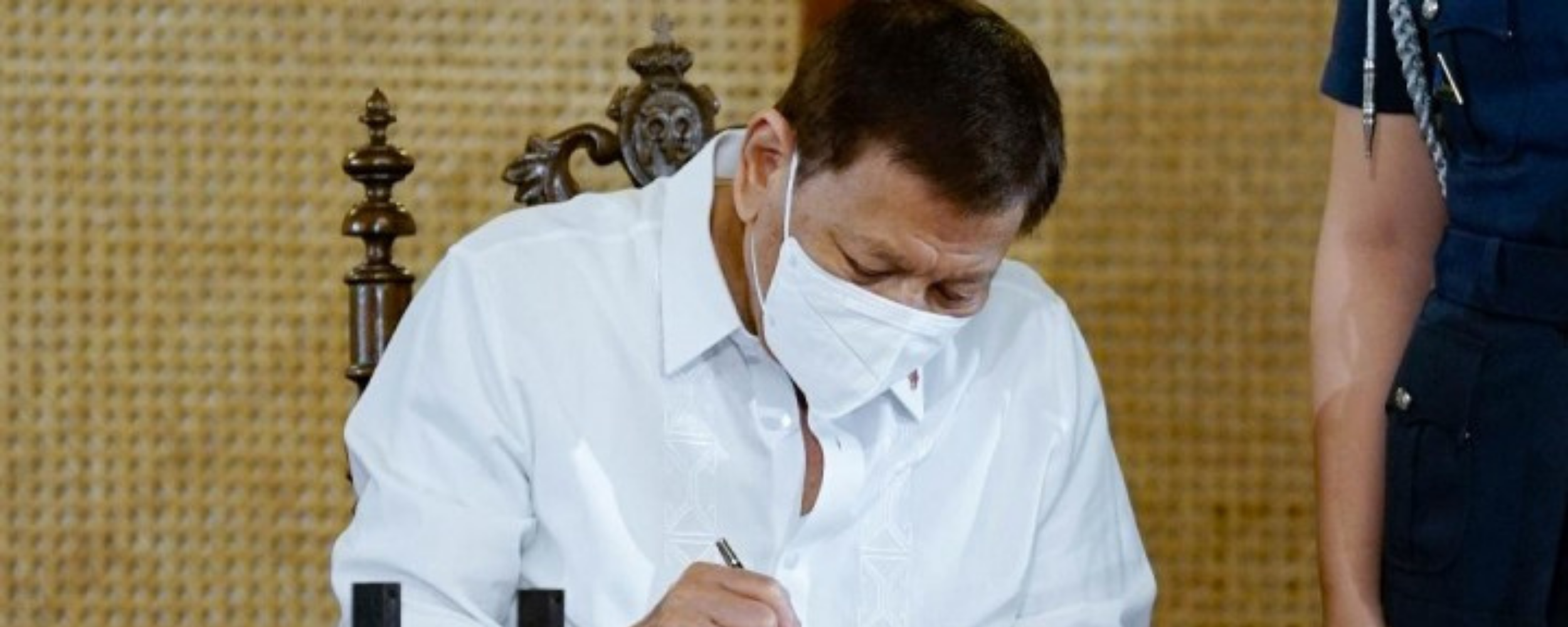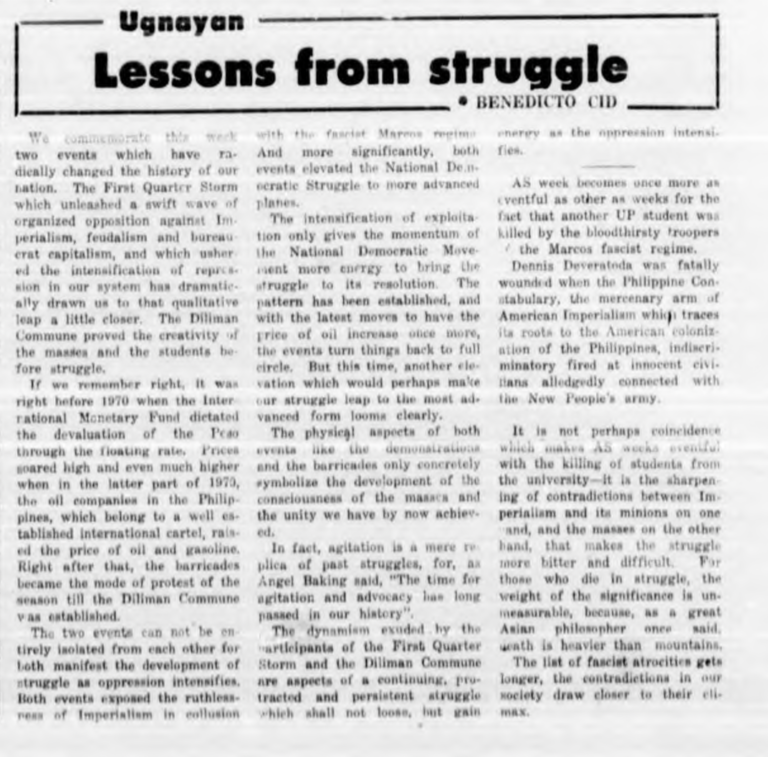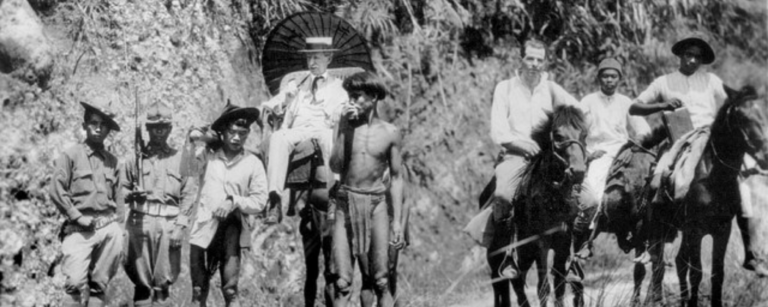Despite Duterte’s populist rhetoric promising a pro-poor presidency, his support for the Public Service Act reveals who he really serves: imperialist countries and the greedy investors in control of them.
Duterte signed Republic Act 11659, a law amending the 85-year-old Public Service Act. It made a distinction between these services and utilities like electricity, water, and petroleum. This allows complete foreign ownership in telecommunications, railways, subways, and airlines, skirting constitutional protections on foreign ownership.

Despite Duterte’s populist rhetoric promising a pro-poor presidency, his support for the Public Service Act reveals who he really serves: imperialist countries and the greedy investors in control of them.
Duterte signed Republic Act 11659, a law amending the 85-year-old Public Service Act. It made a distinction between these services and utilities like electricity, water, and petroleum. This allows complete foreign ownership in telecommunications, railways, subways, and airlines, skirting constitutional protections on foreign ownership.
The president claimed that the bill would save the ailing economy by bringing in more foreign capital, modernizing public services, and supposedly creating even more jobs. Its main sponsor, Senator Grace Poe, said that it would leave no Filipino behind.
They are either lying or just plain wrong. The Philippine Statistics Authority (PSA) reported that the country’s unemployment rate dropped to 6.4% in January 2022. This amounts to around 2.3 million Filipinos that are unemployed. Despite a clear decrease in figures, this does not reflect the quality of jobs the Filipinos take on — much of which are catered to the needs of foreign investors
The amendment comes alongside several other pro-foreigner policies from the current administration. In January, they amended the Retail Trade Liberalization Act of 2000 to make it easier for foreigners to invest. They also allowed 100% equity for foreigners in local businesses by pushing the Foreign Investment Act.
All of these policies hope for an influx of foreign capital, pinning the economy’s hopes on international investors. Instead of developing local industries and adopting Filipino-first policies, the government is kowtowing to foreign interests.
Contrary to Duterte’s claims of rescuing the deteriorating economic situation of the country, this is not what a pro-Filipino economy needs.
These foreign investments will not magically save the economy. As IBON Foundation Executive Director Jose Enrique ‘Sonny’ Africa said, depending on foreign direct investments (FDIs) is lazy economics.
“It is being used as a substitute for the necessary but painstaking strategic agricultural development and industrialization that has served developed countries so well. It is bad economics because no country has ever developed from backwardness on the back of indiscriminate FDI liberalization,” said the think tank leader.
Although foreign investments have risen consistently since the 80s, the economy remains weak. It is still plagued with high unemployment and low wages.
History has shown that while these policies are good for the economy on paper – they boost the GDP and the stock market, for example – their benefits never truly trickle down to the people that need them the most.
Marcos, under pressure from the World Bank, introduced neoliberal policies in the early 80s. After EDSA, Cory Aquino’s economic team praised neoliberalism as well.
Every single administration since has tried to open the economy, and every single one of them has failed to bring about inclusive development.�
Even World Bank President David Malpass – leader of the biggest neoliberalism-supporting institution – has talked about the economic philosophy’s problems. He admitted that neoliberalism’s central tenets have exacerbated inequality, favored rich countries at the expense of poor ones, and worsened the pandemic’s economic crisis.
“FDI must be put in its proper context as a mere means to development and not an end in itself, which is what our economic policymakers make it out to be,” Africa stated.
Contrary to what the proponents claim, the bill will not “save” the economy.
But while foreign-first policies, in general, are already dangerous for the economy, opening up public utilities – or “services,” as this new bill has forced a distinction – leaves the country even more vulnerable.�
The 1987 Constitution explicitly protected public utilities to prevent excessive foreign control. By letting foreigners control important sectors of the economy, the government is exposing the country to countless privacy and security risks.
Allowing access to the telecommunications industry, for example, raises concerns over data harvesting and control of critical technological infrastructure. In a country without strong cyber defense measures, allowing foreign investors to take over the telecommunications industry may leave us defenseless in the internet age.
As Senator Risa Hontiveros said, “The face of conflict and warfare has been irreversibly altered Mr. President and I fear that we have just brought our guards down.”
It also raises sovereignty issues. With the economy heavily oriented toward foreign interests, allowing full foreign ownership of public utilities will only tighten their stranglehold on the country.�
They promised that no Filipino would be left behind. In the end, foreign investors got everything they wanted while Filipino interests were clearly neglected.
Unfortunately, this is nothing new for the Duterte administration. After all, as millions of Filipinos got sick and lost their jobs during the pandemic, they continued to find ways to line their pockets and keep their powerful allies happy.
Wasting potentially life-saving aid for the people most affected by the pandemic, the government’s COVID-19 response was plagued with allegations of corruption and incompetence. Whistleblowers revealed billions worth of anomalous contracts with the Chinese company Pharmally. Senator Manny Pacquiao also raised alarms about corruption in the Department of Social Welfare and Development’s use of StarPay to distribute aid.�
Duterte also rewards loyal cronies with the means to grow their already vast fortunes. Davaoeño businessman Dennis Uy, for instance, managed to get control over the country’s third telecommunications franchise, Malampaya Gas Field, and the logistics for the distribution of election paraphernalia.
Finally, the government continues its long history of weaponizing the military against its own people for the sake of foreign interests. While the military claims to “serve and protect,” it has been used to displace indigenous people for foreign-funded infrastructure and mining projects. It uses its might not to protect the motherland but to intimidate, harass, and even kill fellow Filipinos to please its imperialist masters.
Since March 28, the annual ‘Balikatan’ exercises commenced and have long been condoned by the administration’s critics. This is a direct show of augmented US military force in the country, especially in its principal role in driving the Duterte regime’s counter-insurgency efforts.�
READ: https://bit.ly/3DYsmU9
More than the strengthened influence of the US military, the Balikatan exercises manifest encroachment on the Philippines’ sovereignty as well, clearly serving more of the imperialist’s interests rather than the Filipinos’�
Moreover, the amendments to the Public Service Act are only a part of the Duterte Administration’s utter disregard for what Filipinos need.
RA 11659 has stripped key industries of their constitutional protections, opening them up to foreign control. It will, without a doubt, usher in even more foreign investments into the economy. The president has done a significant service by pushing for these amendments to the Public Service Act.
But who does the president serve? Certainly not the Filipino public.
The president’s daughter Sara is now running for Vice President, and will most likely continue her father’s foreign fixation. She has teamed up with Ferdinand Marcos Jr., son of another dictator that milked the Philippine economy for his own benefit. They have formed an alliance with some of the biggest names in Philippine politics to maintain the status quo and keep themselves in power.
This cannot continue.
We must resist lapdogs like Duterte who continue to choose neoliberal policies over what the country actually needs. We must choose leaders who choose us; leaders who serve their fellow Filipinos instead of their foreign masters.
Featured image courtesy of Philippine News Agency








Usually I don’t read article on blogs, but I wish to say that this write-up very forced me to try and do so! Your writing style has been amazed me. Thanks, quite nice article.